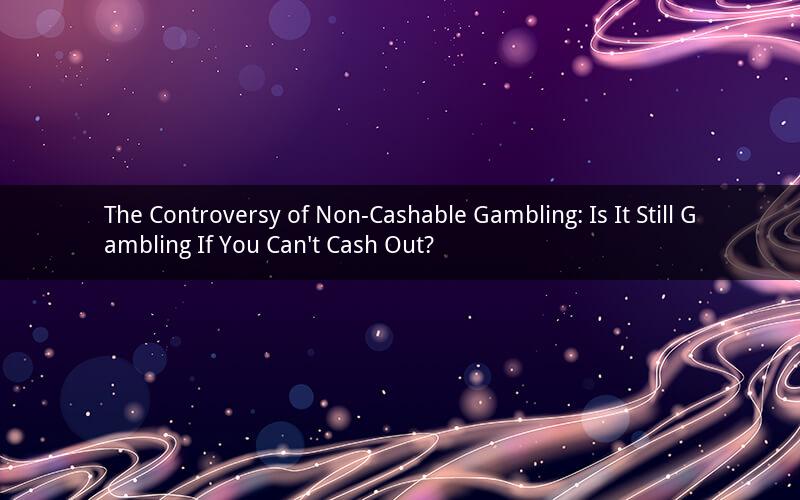
Introduction:
The world of online gambling has evolved rapidly in recent years, offering a wide range of exciting games and opportunities for players. However, one issue that has sparked a considerable debate is whether or not a game can be considered gambling if players are unable to cash out their winnings. This article delves into the controversy surrounding non-cashable gambling and explores the arguments for and against its classification as gambling.
Argument 1: Non-Cashable Gambling is Still Gambling
Proponents of the argument that non-cashable gambling is still considered gambling base their stance on the following points:
1. The core essence of gambling: The fundamental concept of gambling involves risking money on an uncertain outcome with the hope of winning more money. Even if players cannot cash out their winnings, they are still participating in a game where they are risking their money with the intention of winning.
2. The psychological aspect: Non-cashable gambling can lead to psychological issues such as addiction and gambling disorder. Just like traditional gambling, players may develop a strong desire to keep playing in the hope of breaking even or winning big, despite the inability to cash out.
3. The financial aspect: Players who engage in non-cashable gambling are still investing their money in the game, albeit with the understanding that they won't be able to retrieve it. This financial investment aligns with the definition of gambling.
Argument 2: Non-Cashable Gambling is Not Gambling
Opponents of the argument claim that non-cashable gambling should not be classified as gambling for the following reasons:
1. The absence of a cash-out option: The primary distinction between non-cashable gambling and traditional gambling is the lack of a cash-out feature. Without the ability to cash out their winnings, players are not engaging in the act of gambling in the traditional sense.
2. The purpose of the game: Non-cashable gambling games are often designed for entertainment purposes, such as virtual scratch cards or slot machines with in-game rewards. These games may have a gambling element, but the primary goal is not to win money but to enjoy the game itself.
3. The potential for fraud: Non-cashable gambling games can be susceptible to fraud, as players may not be able to verify the legitimacy of the game or the fairness of the odds. This vulnerability is not present in traditional gambling.
Questions and Answers:
1. Q: How does non-cashable gambling differ from traditional gambling?
A: The main difference lies in the absence of a cash-out option in non-cashable gambling. Players cannot retrieve their winnings, while traditional gambling allows players to cash out their winnings.
2. Q: Can non-cashable gambling lead to addiction?
A: Yes, non-cashable gambling can lead to addiction and gambling disorder, as players may develop a strong desire to keep playing in the hope of winning or breaking even.
3. Q: Is non-cashable gambling legal in all countries?
A: The legality of non-cashable gambling varies by country. Some countries have specific regulations that prohibit or restrict non-cashable gambling, while others may allow it under certain conditions.
4. Q: Can players report non-cashable gambling issues to authorities?
A: Yes, players can report non-cashable gambling issues to authorities, especially if they believe they have been defrauded or if the game is operating without proper licensing.
5. Q: What measures can be taken to ensure fair and transparent non-cashable gambling?
A: Ensuring fair and transparent non-cashable gambling requires strict regulations, licensing requirements, and regular audits by independent third parties. Additionally, providing clear information about the game's rules, odds, and the inability to cash out winnings can help players make informed decisions.
Conclusion:
The debate over whether or not non-cashable gambling is considered gambling is complex and multifaceted. While some argue that the act of risking money with the intention of winning aligns with the definition of gambling, others believe that the absence of a cash-out option and the primary focus on entertainment distinguish non-cashable gambling from traditional gambling. As the industry continues to evolve, it is crucial for regulators and operators to strike a balance between innovation and consumer protection to ensure a fair and responsible gambling experience for all players.